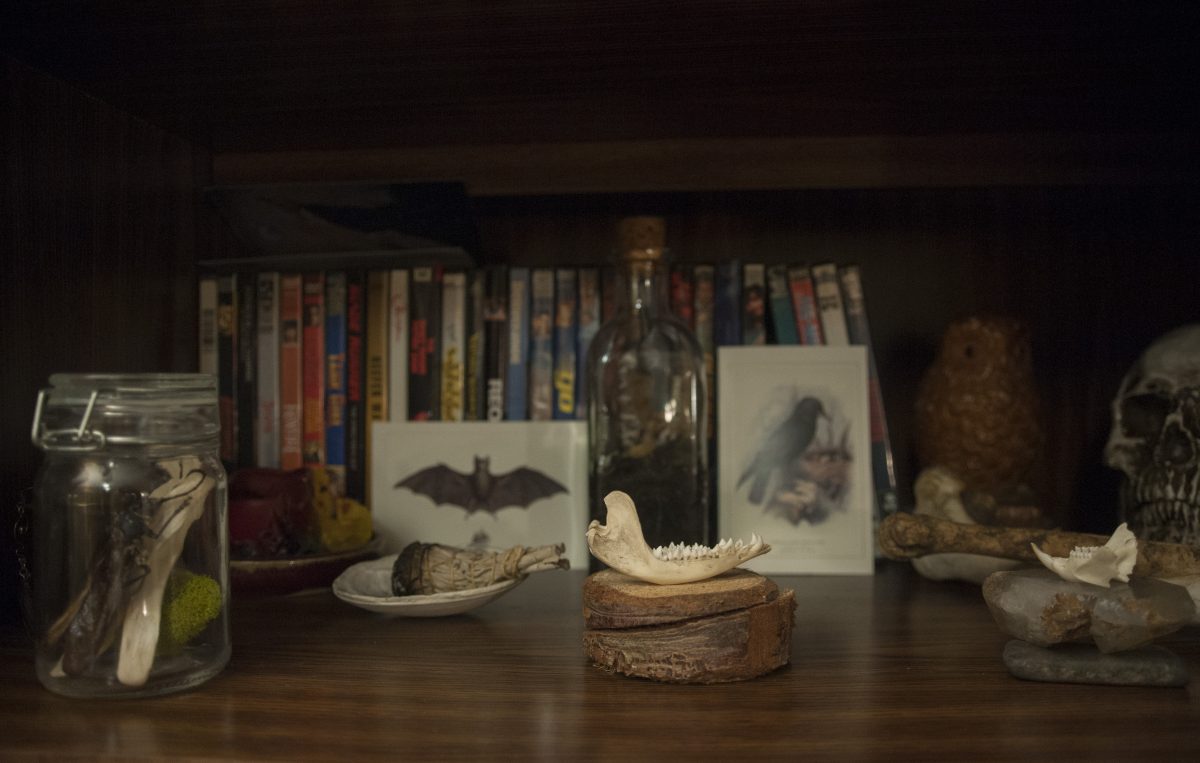With headphones on his* neck and purple Nikes on her feet, junior Silas Lobnibe and senior Manju Bangalore looked more like their undergraduate selves than aliens embroiled in political chaos. The third run-through rehearsal of “The Left Hand of Darkness” took place in UO’s Robinson Theater on October 19. The rehearsal featured Bangalore and Lobnibe crossing the stage, or the frozen wasteland of the planet Gethen, in order to be received at the kingdom city.
After the rehearsal, director John Schmor ran through his pages of notes. Schmor turned from one actor to another.
“You sounded less like a TED Talk this time,” Schmor said. “That moment lost its lyricism. Loved how you pounded the floor twice on ‘over rock and ice.’ Remember you have no idea this envoy is from another planet. Make them real questions instead of rhetorical questions.”
The performance notes proved vital. From foretellers to pregnant kings, the play included many complex characters. Likewise, it featured lengthy monologues that can feel didactic given the amount of cultural and philosophical information they contain.
In November 2017, the University of Oregon Robinson Theater ran a theatrical adaptation of the science fiction novel “The Left Hand of Darkness,” written by Ursula K. Le Guin, over the course of three weekends.
A feminist science fiction titan, Le Guin holds a special tie to the Pacific Northwest. She has resided in Portland, Oregon for nearly 60 years. UO’s Special Collections archives her papers, including manuscripts of first drafts, family photos and correspondence with editors, writers and publishers, in addition to hand-drawn maps and artwork.
Schmor, a University of Oregon professor of performance theory and practices, undertook adapting the novel for the stage. During the process, he received feedback from Le Guin herself.
“I got a note from Ursula once saying that part of what inspired this novel was backpacking in the mountains and feeling time slow down and decompress,” he told the cast during their rehearsal. The ambiguity and fluidity of time and gender are common Le Guinian motifs.
“I really like John’s directing because he knows what he wants,” said lead actor Silas Lobnibe.
Schmor adapted “The Left Hand of Darkness” in 2013 for the Portland Playhouse. In this second adaptation, Schmor hopes to make the play feel more epic, like the novel, which spoke to him as a young man. It was the first book he read that had two “he’s” who loved each other and contemplated sex with one another.
“For a gay person, who didn’t have any literature to look at in the early 80s, that was kind of a marvelous thing,” Schmor said.
The 1969 novel takes place on Gethen, a planet whose residents have no fixed gender. Rather, they are “ambisexual,” occupying a different gender each time they enter “kemmer”—a period of two or three days each month when they are intensely-sexed and able to reproduce. Because no one has a fixed gender, everyone has the potential for pregnancy. The story claims this is why Gethen has no concept of war, although rising political tensions suggest that they are about to “invent” warfare.
Its plot follows Genly Ai, an ambassador of another planet, as he tries to navigate Gethen’s culture with ambisexual Estraven’s assistance. The two initially clash, especially when Genly tries to give Estraven advice despite his limited knowledge of their culture. Estraven saves him from pitfalls as he tries to establish open communications between Gethen and other worlds, even though Gethen has entered political turmoil.
The heart of the play resides in their time together crossing an expanse of ice together over a span of months.
Schmor undertook the project with Jonathan Walters, the artistic director of Hand2Mouth Theatre in Portland, Oregon, never dreaming he would get to meet Le Guin. Schmor had experience adapting novels to plays through his work adapting “Between the Acts” by Virginia Woolf. When Walters initially came up with the idea of adapting a beloved Oregon novel for the stage, he thought of “Sometimes A Great Notion” by Ken Kesey. However, Schmor believes “The Left Hand of Darkness” was ultimately the more interesting choice.
Now, they have collaborated to do what Le Guin could not do in 1969: remove gender pronouns from the material. Genly retains he/ his pronouns and the Gethenians consider him a “pervert” for being constantly gendered.
Schmor chose to avoid using “they/them” as catch-all pronouns. Instead, he opted to only use gender pronouns when referring to someone who is not in the room, a construction easily avoided in theater, especially with a cast of 12. Even so, with less than two weeks to go until opening night, he found two “misters” and two “he’s” in the script that no one had caught before, not even Le Guin. “They’re invasive, really,” he says of gender pronouns.
Manju Bangalore and Silas Lobnibe play the roles of Estraven and Genly, respectively. Bangalore is a senior physics major at University of Oregon who has completed multiple NASA internships with the intent to become an astronaut. She has showcased her acting skills in other productions such as “Fruit Stand” and in her current candidacy for the Miss Oregon USA pageant, with science literacy as her platform.
“I cast Manju because she was the most dignified person who auditioned,” Schmor said. “She has a natural dignity. That’s a quality you can’t instill in a person.”
Estraven remains composed throughout the story, despite it beginning with them informing Genly of their exile from the kingdom on penalty of death. Later, Estraven rescues him from a prison camp where he has been sent to die by leaders of the rebelling territories. They navigate a sledge over frozen expanses to get back to the kingdom, where Estraven is an outlaw.
“The challenge of empathizing with other people draws me to theater,” Lobnibe says, a science and math major who first became involved in theater in a high school production of “Mary Poppins.” After spending his early childhood in Ghana and then immigrating with his family to the United States, he feels that “being this character in particular, being this outsider, is something I can relate to–having this mission, like going to school in the U.S., having these goals.”
Schmor was also drawn to Lobnibe’s dignity, but wanted him to embody what Lobnibe describes as “excitement and newness” as an envoy on a new planet, with a different social fabric than any of the other worlds he has visited.
“Genly’s got to be a bit more rambunctious and flawed,” Schmor said. Genly, considered a “pervert alien envoy,” learns that Estraven faced exile from their home years before facing exile from the kingdom. Ultimately, they are two outsiders thrust together by circumstances.
On opening night, people filed into the Robinson Theater despite Schmor’s concerns that the play is not a “high drama.” Although it was not a full house, word of mouth built until the last two nights of the performance saw sell-out crowds, filling the Robinson for the first time in years.
Schmor wants to put the project away. “If I were to produce it again, I would just keep rewriting it,” he said.
Seattle theatrical company Book-It expressed interest in producing the play. Additionally, Le Guin signed a preliminary deal for a television mini-series based on the novel. However, it remains uncertain whether it will generate enough interest to go to production.



![Words and Photos by Sarah Northrop Dark rooms, dark skies: Behind black curtains, a metal basin sits among scattered jugs of chemicals, a row of enlargers and mismatched development supplies. On the outside of the darkened space, a red warning light switches on. There’s a darkroom in use. And I’m […]](https://ethos.dailyemerald.com/wp-content/uploads/2018/04/a88cc0af91f19341e0e8afe516d39192.jpg)

![Generations of handmade Native American regalia and decor fill the walls of Crystal Szczepanski’s home on the Confederated Tribes of Grand Ronde reservation. Among them hangs a Pendleton and leather cradleboard crafted by relatives for Szczepanski after the birth of her daughter, Ravin. A carving of a wood canoe is […]](https://ethos.dailyemerald.com/wp-content/uploads/2018/04/b4d48e73893ec02eabc7a89b5591d678-800x1200.jpg)

![Before dinner, Paige gives James his medicine in the form of a cannabis oil filled capsule. James takes about 45mg of CBD and THC/THCA oil throughout the day. The CBD helps reduce his seizures while the THC and THCA helps regulate his emotions and impulse control. “He is more able […]](https://ethos.dailyemerald.com/wp-content/uploads/2018/01/d78a0fd1da4fdc3992cdea4aebdc20db-1200x800.jpg)


![[Photo Courtesy of the Lara Family]
Ruben embraces his beloved childhood goat, Katrina.](https://ethos.dailyemerald.com/wp-content/uploads/2025/05/katrina-1-1060x1200.jpg)


